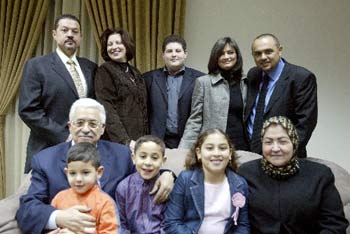
The whole family of Mahmoud Abbas (including his wife,
1st R and his eldest son, 1st left, 2nd row) have a photo taken in Abbas's
office in the West Bank city of Ramallah, Jan. 9. (Xinhua/AFP Photo)
Mahmoud Abbas is set to win the chairmanship of the Palestinian National
Authority (PNA) as exit polls showed that he gained about 66 percent of the vote
in the Sunday's election.
Abbas, candidate of the mainstream Fatah movement of the Palestine Liberation
Organization (PLO) and chief of the PLO Executive Committee, has proclaimed
victory while addressing a rally of his supporters. The official result will
come out Monday.
Abbas, also known as Abu Mazen, was born in Safad in 1935. His family sought
refuge in Syria in 1948, when the first Middle East War broke out.
During his stay in Syria, he obtained a law degree in the University of
Damascus.
He later went to Moscow to pursue a PhD degree in history in the Oriental
Institute, during which he showed interest in the study of Israel and
concentrated on Zionism.
Abbas has devoted much of his life to the struggle for an independent
Palestinian state. He was a co-founder of the Palestine National Liberation
Movement (Fatah) and has been a member of the Fatah's Central Committee since
1964.
In the 1970s, Abbas joined the PLO Executive Committee. Since 1977, he has
begun contacts on behalf of the PLO with Israel's left-wingers.
In 1993, Abbas held 14 rounds of negotiations with Israel in the Norwegian
capital Oslo, paving the way for the signing of the first peace deal between the
Palestinians and Israel.
On Sept. 13, 1993, Abbas and the then Israeli Foreign Minister Shimon Peres
signed the Declaration of Principles on Interim Self-Government Arrangements, or
the so-called Oslo Accords, in Washington.
In 1996, Abbas was elected secretary general of the PLO Executive Committee.
He became the first Palestinian prime minister in March 2003, but resigned
six months later over disputes with late Palestinian leader Yasser Arafat on
security and administration issues.
He was named chairman of the PLO Executive Committee after the death of
Arafat on Nov. 11, 2004.



